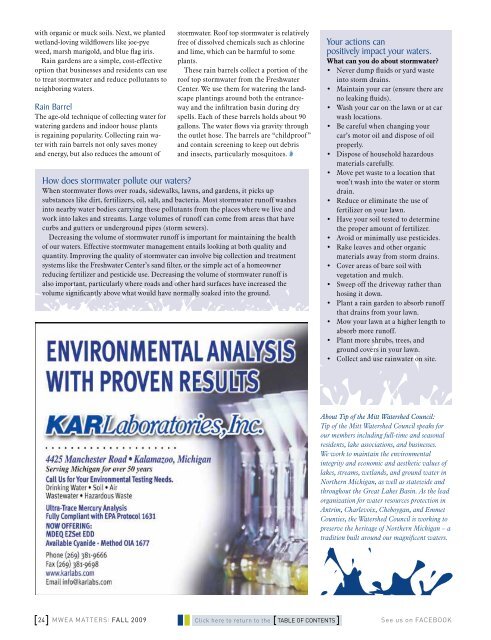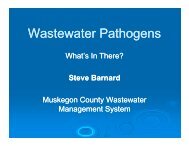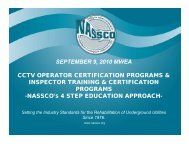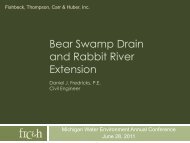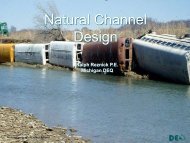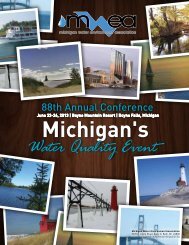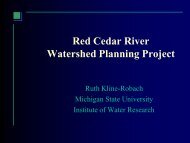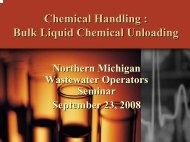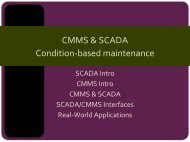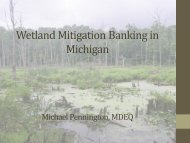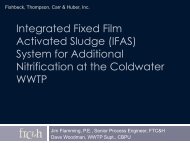Fall 2009 - Michigan Water Environment Association
Fall 2009 - Michigan Water Environment Association
Fall 2009 - Michigan Water Environment Association
You also want an ePaper? Increase the reach of your titles
YUMPU automatically turns print PDFs into web optimized ePapers that Google loves.
with organic or muck soils. Next, we planted<br />
wetland-loving wildflowers like joe-pye<br />
weed, marsh marigold, and blue flag iris.<br />
Rain gardens are a simple, cost-effective<br />
option that businesses and residents can use<br />
to treat stormwater and reduce pollutants to<br />
neighboring waters.<br />
Rain Barrel<br />
The age-old technique of collecting water for<br />
watering gardens and indoor house plants<br />
is regaining popularity. Collecting rain water<br />
with rain barrels not only saves money<br />
and energy, but also reduces the amount of<br />
stormwater. Roof top stormwater is relatively<br />
free of dissolved chemicals such as chlorine<br />
and lime, which can be harmful to some<br />
plants.<br />
These rain barrels collect a portion of the<br />
roof top stormwater from the Freshwater<br />
Center. We use them for watering the landscape<br />
plantings around both the entranceway<br />
and the infiltration basin during dry<br />
spells. Each of these barrels holds about 90<br />
gallons. The water flows via gravity through<br />
the outlet hose. The barrels are “childproof ”<br />
and contain screening to keep out debris<br />
and insects, particularly mosquitoes.<br />
How does stormwater pollute our waters<br />
When stormwater flows over roads, sidewalks, lawns, and gardens, it picks up<br />
substances like dirt, fertilizers, oil, salt, and bacteria. Most stormwater runoff washes<br />
into nearby water bodies carrying these pollutants from the places where we live and<br />
work into lakes and streams. Large volumes of runoff can come from areas that have<br />
curbs and gutters or underground pipes (storm sewers).<br />
Decreasing the volume of stormwater runoff is important for maintaining the health<br />
of our waters. Effective stormwater management entails looking at both quality and<br />
quantity. Improving the quality of stormwater can involve big collection and treatment<br />
systems like the Freshwater Center’s sand filter, or the simple act of a homeowner<br />
reducing fertilizer and pesticide use. Decreasing the volume of stormwater runoff is<br />
also important, particularly where roads and other hard surfaces have increased the<br />
volume significantly above what would have normally soaked into the ground.<br />
Your actions can<br />
positively impact your waters.<br />
What can you do about stormwater<br />
• Never dump fluids or yard waste<br />
into storm drains.<br />
• Maintain your car (ensure there are<br />
no leaking fluids).<br />
• Wash your car on the lawn or at car<br />
wash locations.<br />
• Be careful when changing your<br />
car’s motor oil and dispose of oil<br />
properly.<br />
• Dispose of household hazardous<br />
materials carefully.<br />
• Move pet waste to a location that<br />
won’t wash into the water or storm<br />
drain.<br />
• Reduce or eliminate the use of<br />
fertilizer on your lawn.<br />
• Have your soil tested to determine<br />
the proper amount of fertilizer.<br />
• Avoid or minimally use pesticides.<br />
• Rake leaves and other organic<br />
materials away from storm drains.<br />
• Cover areas of bare soil with<br />
vegetation and mulch.<br />
• Sweep off the driveway rather than<br />
hosing it down.<br />
• Plant a rain garden to absorb runoff<br />
that drains from your lawn.<br />
• Mow your lawn at a higher length to<br />
absorb more runoff.<br />
• Plant more shrubs, trees, and<br />
ground covers in your lawn.<br />
• Collect and use rainwater on site.<br />
About Tip of the Mitt <strong>Water</strong>shed Council:<br />
Tip of the Mitt <strong>Water</strong>shed Council speaks for<br />
our members including full-time and seasonal<br />
residents, lake associations, and businesses.<br />
We work to maintain the environmental<br />
integrity and economic and aesthetic values of<br />
lakes, streams, wetlands, and ground water in<br />
Northern <strong>Michigan</strong>, as well as statewide and<br />
throughout the Great Lakes Basin. As the lead<br />
organization for water resources protection in<br />
Antrim, Charlevoix, Cheboygan, and Emmet<br />
Counties, the <strong>Water</strong>shed Council is working to<br />
preserve the heritage of Northern <strong>Michigan</strong> – a<br />
tradition built around our magnificent waters.<br />
24 MWEA MATTERS: <strong>Fall</strong> <strong>2009</strong><br />
Click here to return to the TABLE OF CONTENTS<br />
See us on FACEBOOK


